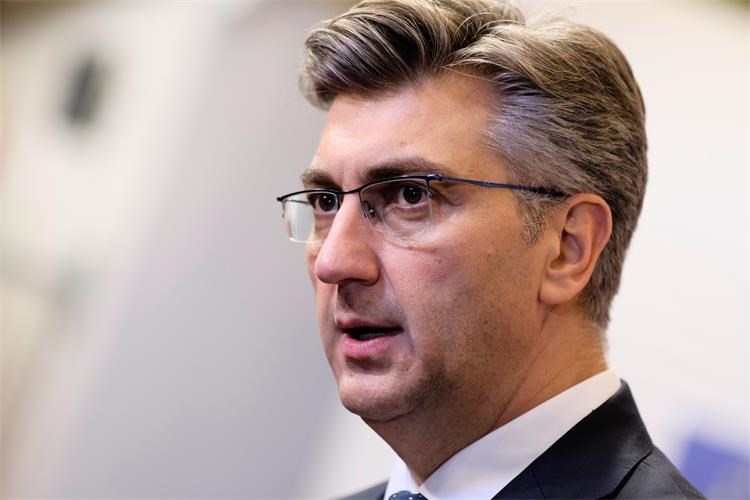- Published: 08.07.2019.
PM: Accepted letter of intent to join ERM II one more confirmation of Croatia's reform course
Prime Minister Andrej Plenkovic said on Monday the acceptance of Croatia's letter of intent to join the Exchange Rate Mechanism (ERM II) was yet another confirmation of the country's good reform course, according to a government press release.
The Eurogroup held a meeting in Brussels today at which it accepted Croatia's letter of intent, which the country sent euro area member states, Denmark and EU institutions. The meeting was attended by Croatian Finance Minister Zdravko Maric and Croatian National Bank (HNB) governor Boris Vujcic.
After coming out of the excessive macroeconomic imbalances procedure, the restoration of the investment credit rating, the 3.9% GDP growth generated in Q1 2019, the acceptance of the letter of intent to join ERM shows that Croatia is on the right track and that the European Commission, the European Central Bank (ECB) and other international financial institutions recognise the government's reform efforts, Plenkovic said, per the press release.
Our letter of intent shows willingness to carry out reforms in order to additionally prepare for participating in ERMII, he said. Joining the euro area is a gradual process whose realisation will make Croatia a member of the innermost circle of EU countries, which will benefit Croatia's economy and citizens, he added.
A statement issued after the Eurogroup meeting welcomed Croatia's letter of intent. "We welcome the intention of the Croatian authorities to put in place the necessary elements for a successful entry into ERM II. Following constructive discussions with the ECB, the Commission, the euro area Member States and Denmark, Croatia has taken a number of commitments in policy areas which are of high relevance for a smooth transition to, and participation in ERM II."
It added that "Croatia has sent a request to enter into close cooperation with the ECB in line with the existing procedures, and will undertake the necessary preparations accordingly – including support to the ECB’s comprehensive assessment."
"Additional commitments relate to the macro-prudential framework, the anti-money laundering framework, the collection, production and dissemination of statistics, public sector governance and reducing the financial and administrative burden. Such reform efforts towards a more robust financial sector, stronger institutions and public governance and more efficient economic structures will contribute to the successful participation of Croatia in ERM II," the statement said.
"The ECB and the Commission will monitor the effective implementation of these commitments... Once they have provided a positive assessment, a decision will be taken by the ERM II parties on the formal application of the Croatian authorities for ERM II participation. The decision will be linked to the ECB decision on close cooperation, in full respect of the conditions specified in the legal framework. This would imply that Croatia simultaneously joins ERM II and the Banking Union," the statement said.
"The ECB could be expected to conclude its comprehensive assessment within approximately one year after Croatia's formal application for close cooperation... In line with past practice, Croatia is also expected to take further commitments at the moment of joining ERM II with the aim of achieving a high degree of sustainable economic convergence by the time the euro will be introduced," the statement said.
Croatia sent the letter, signed by Maric and Vujcic, on July 4. It was the first formal step towards participation in ERM II which precedes the adoption of the euro as legal tender.
The letter of intent was accompanied by an action plan detailing reforms that Croatia will implement before entering ERM II.
The letter expresses Croatia's readiness to implement reforms as part of further preparations for participation in ERM II. By successfully participating in ERM II for at least two years, Croatia should formally meet the exchange rate criterion of nominal convergence. Croatia has been meeting the other criteria for a while, namely price stability, public finance sustainability and interest rate convergence, while the prudent monetary and fiscal policy should ensure that it stays that way.
In consultation with the EU institutions, in the letter of intent Croatia has undertaken to implement reforms in six areas: to further strengthen the supervision of the banking system by establishing close cooperation between the HNB and the ECB; strengthen the macroprudential policy framework by introducing an explicit mandate for borrower-based measures; strengthen the anti-money laundering framework; upgrade the system of statistical data collection, processing and publication; improve public-sector management; and reduce the administrative and financial burden on the economy.
Croatia has already begun implementing some of these measures. On May 27, it sent a request to the ECB for establishing close cooperation between the HNB and the ECB.
Croatia intends to implement the measures listed in the letter of intent and the action plan by mid-2020, after which the EU institutions will assess whether the measures have been adequately implemented. After receiving a positive response, Croatia will formally enter ERM II.
Text: Hina
